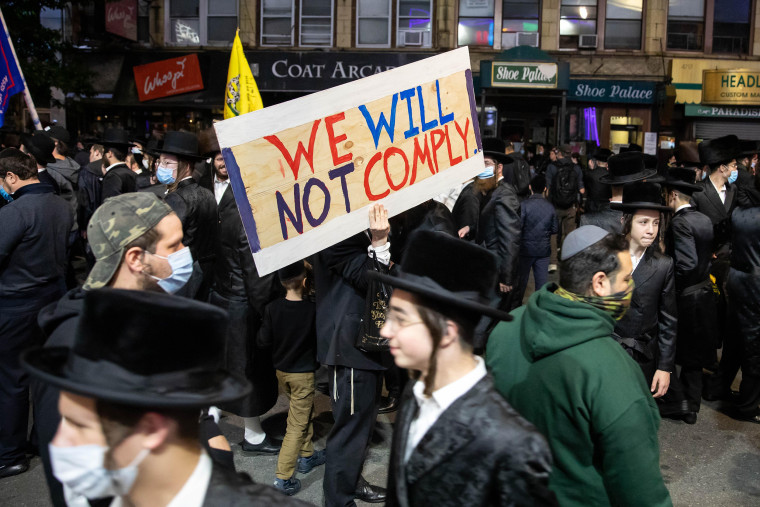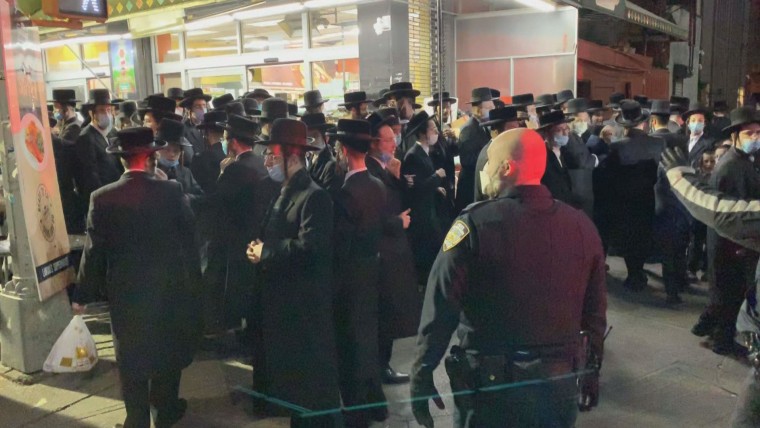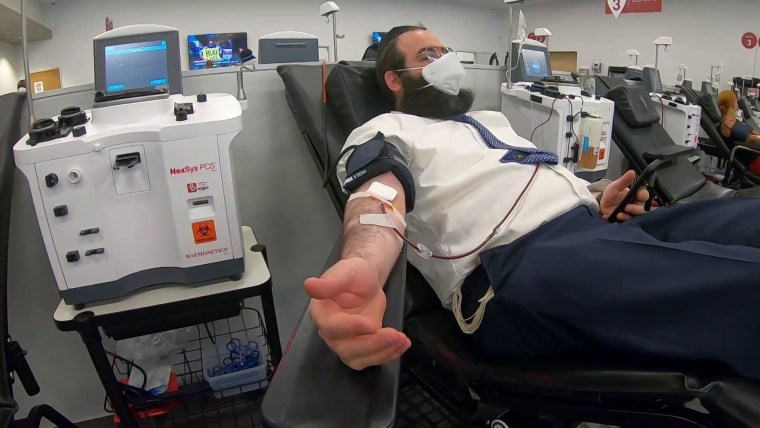When Covid-19 rules are flouted by ultra-Orthodox Jews, it isn't anti-Semitism to call it out

As authorities scramble to confront a second wave of Covid-19 building across America, anger is mounting against government efforts to stop the spread within a population among those hardest hit by the pandemic: the sprawling ultra-Orthodox Jewish community of metropolitan New York.
For the ultra-Orthodox to complain that they're being discriminated against when they come under extra scrutiny is essentially to complain that it's anti-Semitic to notice what they're doing.
With the pandemic in its eighth month and restrictions cutting into the religious practices of the tight-knit, strictly observant subculture, it's understandable that weariness and impatience would set in. Unfortunately, that's leading to a growing sense in the community that it is being singled out unfairly for deprivation of its religious rights, often accompanied by open complaints of anti-Semitism as the cause for the lockdowns.
It's
a dangerous misperception, for both the ultra-Orthodox and their
neighbors. The virus doesn't single out groups by religion, race or
national origin; it's an unbiased scourge. Nor are New York officials'
containment efforts guided by any such bigoted motives. Enforcement goes
where the germs are. And the germs, tragically, are hitting
ultra-Orthodox Jews with special fury.
From the beginning of the crisis in March, densely populated ultra-Orthodox neighborhoods in Brooklyn, Queens and key suburbs emerged as leading viral hot spots in hard-hit New York. Their outsize vulnerability was due in large part to a traditional religious culture built on a continuous cycle of obligatory, large-scale gatherings for prayer, study, weddings and funerals, all cherished rituals that can and apparently did serve as super-spreader events.
Compounding these risks has been the mundane physical structure of the insular ultra-Orthodox lifestyle, built on large families' living in cramped homes packed into dense neighborhoods, making social distancing extraordinarily difficult.
But because those are religious obligations and cornerstones of their Jewish identity structure, government-mandated lockdowns and social distancing can and too often did look from an ultra-Orthodox perspective like government assaults on the religion itself.
It might seem surprising that the community's behavior hasn't been dictated from start to finish by the fundamental Jewish principle known as "protection of human life" — the commandment that nearly all religious rules be suspended if a human life is the balance. And, indeed, while many respected rabbis urged members of the community to follow that guidance, it appears that the principle was hard to visualize when the threat wasn't an enemy gun or a car crash — events that Jews regularly violate religious restrictions to address — but an invisible bug.
That difficulty wasn't helped by a small but influential minority within the community that has been nodding toward a competing principle — that of sanctifying God's name by openly defying oppressors' bans, even at risk to one's own life and limb. While rarely stated aloud right now, this notion has been encouraged by a handful of well-known rabbis, most of them Israelis with strong followings in the United States, and, more subtly, by a deep-seated distrust of the modern world and its dictates, which often take the form of medical directives.
After a long spring of cat-and-mouse police chases after clandestine synagogue services and other attempts by the ultra-Orthodox to evade quarantine, followed by the summer slowdown in infections, the New York City health department reported startling new statistics in late September showing that certain neighborhoods in Brooklyn and Queens, most of them featuring large ultra-Orthodox populations, were reporting virus test results averaging 4.7 percent positive, compared to just over 1 percent in the rest of the city. Two weeks later, the average jumped to more than 6 percent.
The nine "red zone" ZIP codes on the state map of the highest infection rates at that time — which carried the heaviest public restrictions as a result — were nearly all major ultra-Orthodox population centers. Among other things, houses of worship in red zones were limited to 10 attendees at a time under a policy announced by Gov. Andrew Cuomo.
Ultra-Orthodox community leaders maintain — and government authorities largely agree — that most ultra-Orthodox Jews are following government mandates and that violators represent only a minority. That minority, however, seems to be large enough to push the entire community into vastly disproportionate infection territory, given that observance by a vague "most" isn't sufficient to stop the virus.
Yet the reaction of much of the ultra-Orthodox community has been to protest the lifesaving government restrictions — sometimes violently — and to paint them as anti-Semitic. In a typical example, a weekly tabloid with a mostly Orthodox readership touted on its front page an essay headlined "De Blasio And Cuomo Have Declared War On Us," which accused the governor and New York Mayor Bill de Blasio of "treachery and blatant anti-Semitism" and claimed that they "want to destroy our schools and way of life."
And in a toned-down critique, Agudath Israel of America, the main advocacy body representing ultra-Orthodox Jews, argued that while the ban on large services "discriminates against all religions," it "disproportionately impacts the religious services of Orthodox Jews," who would be shut out from traditional synagogue observance of two major religious holidays.
But for the ultra-Orthodox to complain that they're being discriminated against when they come under extra scrutiny is essentially to complain that it's anti-Semitic to notice what they're doing. And in this case, defiantly maintaining tradition doesn't risk just their own lives, which is their prerogative, but their neighbors' lives, as well. The trap they're caught in is tragic, but society has a right and an obligation to protect its people's welfare.
Indeed, the greater anti-Semitism threat likely comes not from failing to defend Jewish rights but from trying too hard. When Jewish communities, Orthodox or not, ask for special accommodations to meet their particular needs, it's often seen by other communities as cutting in line, wheedling extra privileges while broader needs go unmet.
To be sure, part of the ultra-Orthodox misperception that anti-Semitism is at work comes from memories of long centuries when anti-Jewish powers forced Jews to give up their traditions or take them underground. These memories, and the alarms they trigger, are familiar to Jews of every religious and ideological stripe.
Throughout their history, Torah-observant Jews have faced emergencies that have forced them to compromise and bend some laws, sometimes permanently.
At the same time, it's precisely this history that should serve as a guide for the ultra-Orthodox community today in combating Covid-19. Throughout their history, Torah-observant Jews have faced emergencies that have forced them to compromise and bend some laws, sometimes permanently.
Disasters, usually in the form of anti-Semitic persecution, have forced them to drop some practices and amend others to survive until better times returned. So it was after the Roman destruction of Solomon's Temple in ancient Israel and during the Spanish Inquisition, the medieval Polish-Ukrainian pogroms, the Soviet era and the Holocaust.
But America isn't any of those things. Instead, it is the ultra-Orthodox community itself that right now poses the most danger to its own continuity.





4 comments:
https://www.youtube.com/watch?reload=9&v=4MfUILgImcY&feature=emb_logo
We waited 14 long years for a “Borat” sequel, so let’s get to it: No, sorry it isn’t as good as the original.
How could it be? Mostly unscripted “Borat: Cultural Learnings of America for Make Benefit Glorious Nation of Kazakhstan” came from nowhere in 2006 to runaway success, captivating conversations at the Agudah Fresser Convention. It had “the scene” — Kolkoesque & Mondrowitzesque: completely naked Borat & his plump, hirsute pal fight in a packed hotel ballroom. Those of us lucky enough to see it were treated to pandemonium most Convention non-goers only dream about.
The good news is #2: “Borat Subsequent Moviefilm: Delivery of Prodigious Bribe to American Regime for Make Benefit Once Glorious Nation of Kazakhstan”, still is very, very good. The 1st film’s quest for Pamela Anderson is exchanged with Borat trying to gift his underage daughter, 1st attempt to VP Mike Pence & then “Ronald McDonald Trump” pal Rudy Giuliani.
It’s Giuliani that's most shocking. The former NYC mayor is significantly “handsy” with lovely young Borat’s daughter who gushes as she interviews him. It’s unclear how many hidden cameras are in the hotel & what was truly caught on tape, but one thing for certain: people will ask a lot of questions.
Beyond hilarity of powerful men making dopes of themselves, Borat's dispatched by the Kazakh prime minister back to “US & A” to restore the shamed nation’s good name. An excuse, naturally, for a repeat of backward, arrogant beliefs resulting in “high fives” from a wide array of racists & lunatics.
The baker puts “Jews won't replace us” on cake icing; a propane salesman chuckling how many gypsies can be torched to death.
Naturally, non-actor scumbags duped to say repulsive things on camera see it differently (many lawsuits followed & so did many Kazakhs). This 2nd group has a point. Americans don’t know anything about Kazakhs, but should they meet one, gut instinct may be to shout “Great Success!” or other dopey catchphrase.
Collateral damage for the greater good: In the original, think the feminist trio who listen to Borat’s gross jokes before dismissing him. In the sequel, this happens when Borat decides to end his life, so he heads to the synagogue to await the next mass shooting.
He wants to end it all because he’s had his fundamentals destroyed. Among them: the Holocaust, one of Kazakhstan’s proudest moments (satire), is now proven not to exist. It says so on Facebook. Borat heads to synagogue, dressed as a Jew, but meets 2 elderly women. When they explain seeing concentration camps with their own eyes, Borat is relieved.
Borat bunks with QAnon conspiracy nuts who think Hillary Clinton drinks the blood of infants & created coronavirus.
Borat movies are very sad. People among us don’t have a whiff of shame. It's available on Amazon, which is good, because Bezos has enough money for lawsuits.
If enough people watch it, maybe Borat running around in ridiculous costumes, singing “chop ’em up like Saudis do!” isn’t something that should be recognized by film critics, but by heads of state.
Maybe Borat will make benefit this glorious nation after all.
Isn't it time that people take responsibility for their decisions? If they're getting sick because of their behavior, then God must be sending them a message that it's time to leave the city of shmutz. Perhaps, they need to find their own enclaves out in the country full-time and fulfill that mission.
Rudy Giuliani is shown in compromised position in a hotel room with a young actress pretending to be a journalist in Sacha Baron Cohen’s latest mockumentary, sequel to his hit “Borat” film.
The scene shot in a New York hotel room in July — which resulted in Giuliani calling police — includes a moment when Giuliani's lying on a bed, tucking his shirt with his hand down his pants & the young woman nearby.
Giuliani went to the hotel room thinking he'd be interviewed on the Trump administration COVID response. The young woman is flirtatious with him & invites him to the bedroom, which is rigged with hidden cameras.
Giuliani asks for her phone number & address. He lies back on the bed to tuck in his shirt & has his hands in his pants when Baron Cohen rushes in wearing an outlandish outfit.
Baron Cohen, who was disguised as part of the crew, screams the young woman is 15. Up to that point, there's no indication she's underage. The character, Borat’s daughter, is played by actress Maria Bakalova, who's listed as 24 years old on the Internet Movie Database site.
Speaking on his weekly radio program on WABC, Giuliani called the scene “a hit job.”:
“I had to take off electronic equipment. When it came off, some of it was in the back & my shirt came a little out, though my clothes were entirely on. I lean back to tuck my shirt in & at that point, they have this picture which looks doctored. I'm tucking my shirt in, I assure you, it’s all I was doing.” He realized he was being set up when the woman asked if he wanted a massage.
At one point, while he thought the interview was genuine, he listened to Bakalova’s problems & “actually prayed with her.”
“At no time before, during, or after the interview was I ever inappropriate,” Giuliani later tweeted. “If Sacha Baron Cohen implies otherwise, he's a stone-cold liar.”
The former NYC mayor called police, but there's no indication of an investigation. Giuliani spoke to the New York Post about it in July, but didn't mention the bedroom aspect.
“This guy runs in wearing a crazy, transgender outfit,” he told the Post.
“Pink bikini with lace under translucent mesh, it looks absurd. He had a beard, bare legs & wasn’t what I call attractive. He's screaming, I think it's a scam or shake-down, so I call police. He then ran away,” Guiliani said.
Post a Comment